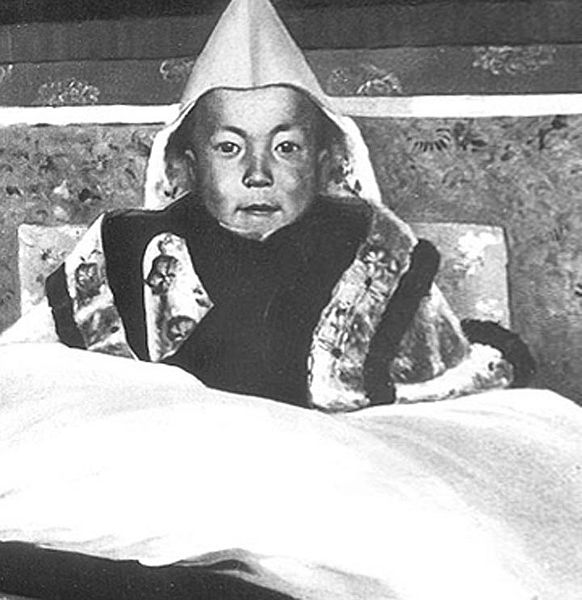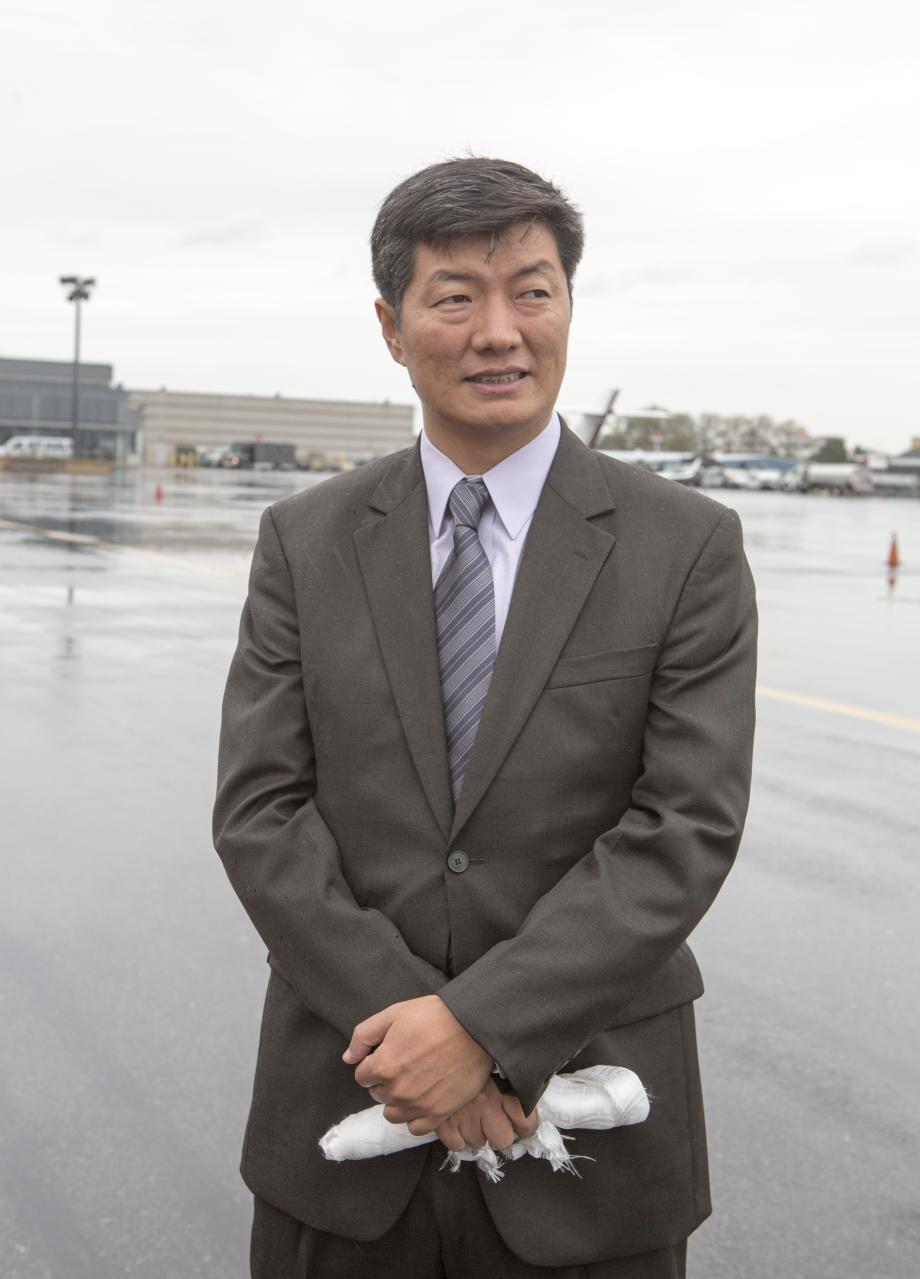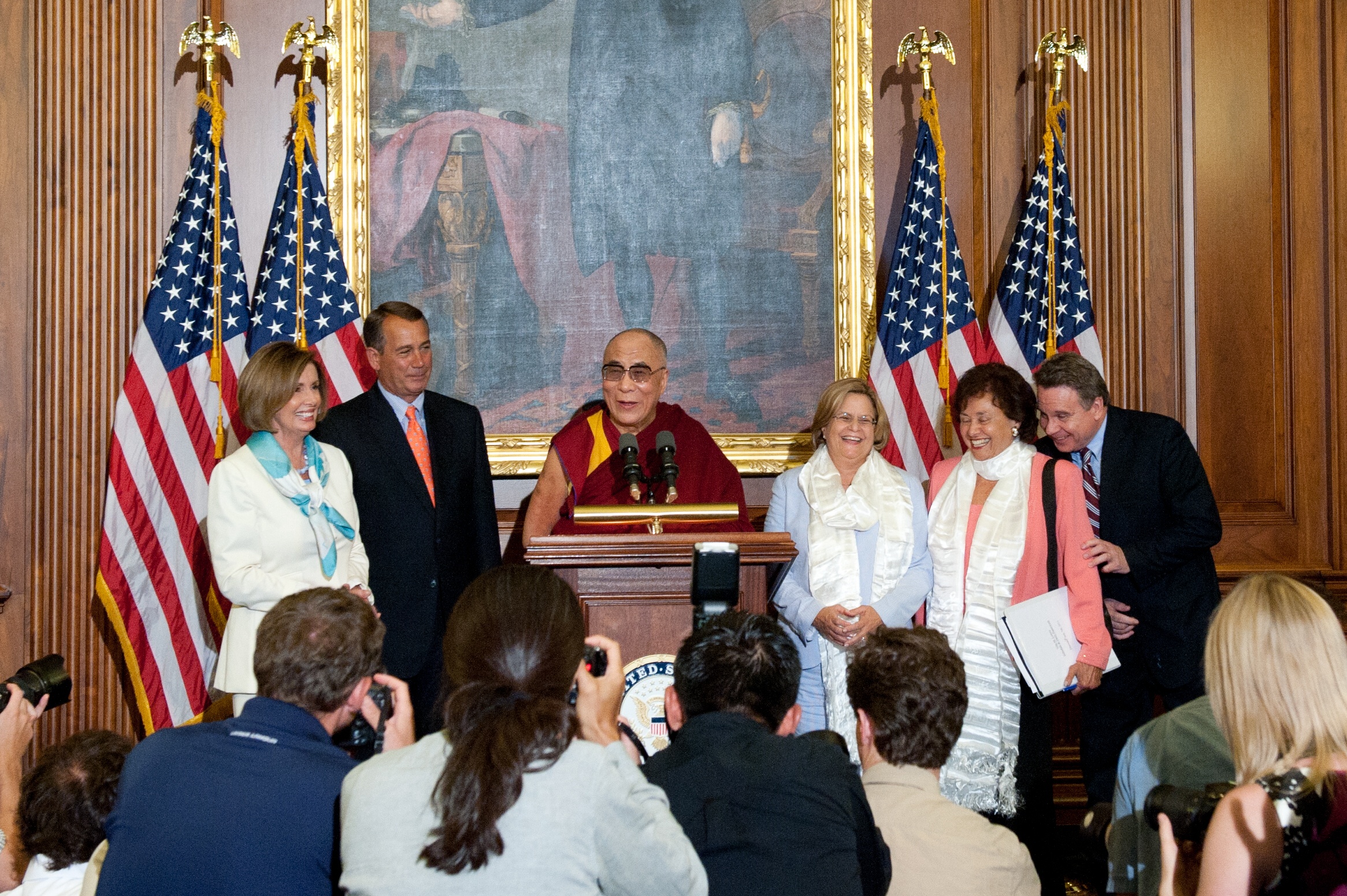From May 19 to 21, the Dalai Lama was here in Louisville, Kentucky. He was met by predictable adulation, speaking to a crowd of 15,000 at the KFC Yum! Center arena. Tickets sold for $50-$100. Weeks later, his aura is still visible in the form of prominently displayed books and T-shirts for sale at local health food stores. For a serious supporter of democracy in Asia, however, this adulation seems misplaced. The Dalai Lama is the unelected leader of a fairly small religion (Yellow Hat Buddishm has between 10 and 20 million adherents making it roughly the same size as the Jehovah's Witnesses movement). More importantly, the Dalai Lama is an unproved democrat. Those interested in a democratic Tibet should instead look to Lobsang Sangay, the current Sikyong (equivalent to a prime minister) of the Tibetan Government-in-Exile and a man who has earned his prominence through hard work and won his position by election.
 14th Dalai Lama, at his enthronement ceremony, February 22, 1940 in Lhasa
14th Dalai Lama, at his enthronement ceremony, February 22, 1940 in Lhasa
Born in a Tibetan refugee settlement in Darjeeling in 1968, Sangay excelled at school and his parents sold one of the family's three cows to pay for his education. After earning his Bechelor's degree at the University of Delhi, Sangauy won a Fulbright and became the first Tibetan ever to earn a Doctor of Juridical Science degree from Harvard Law School. His dissertation was a case study of Tibet's government in exile, a government which he would be head of less than a decade later, when he won 55% of approximately 50,000 ballots cast by Tibetan exiles. Sangay himself has written a thoughtful defense of the Dalai Lama's democratic credentials. But there seems to be room for doubt.
 Lobsang Sangay in Boston, 2012 (Photo: Christopher Michel)
Lobsang Sangay in Boston, 2012 (Photo: Christopher Michel)
When the People's Republic of China took control of Tibet in 1950 it was an extremely underdeveloped country where a tiny religious and aristocratic elite ruled over a mass of poor peasants embedded in "a caste-like social hierarchy". This situation was similar to that in neighboring areas like Bhutan or Nepal and the Dalai Lama only ruled from 1950-59 under the sovereignty of the PRC. Yet, despite claiming an affinity for Marxism, Dalai Lama does not seem particularly cognizant of, or apologetic for, the incredibly unfair and repressive regime which he inherited. In his 1991 autobiography he wrote: "...you could tell just by comparing their faces that the Tibetans were much happier [than the Chinese]. This was due to a number of cultural factors I feel. Firstly, the relationship between landlord and serf was much milder in Tibet than in China and conditions were less poor and harsh." Whatever the spiritual benefits of poverty, saying that your "serfs" are happier than others does not seem like an appropriate sentiment for someone interested in democracy or equality, much less Marxism.
During the anti-Chinese uprising in 1959, the Dalai Lama escaped into exile. Currently, he flies around the world in private jets, lecturing to sold-out auditoriums, furiously publishing books (his website lists over 100), and hobnobbing with celebrities. One cannot blame him, perhaps. But, his life of comfort and fame in exile puts him in stark contrast to a figure such as ardent democrat Aung San Suu Kyi who endured almost 15 years of house arrest in Burma.
 The Dalai Lama receives a warm welcome from the US Congress (Photo: Nancy Pelosi)
The Dalai Lama receives a warm welcome from the US Congress (Photo: Nancy Pelosi)
In exile, the Dalai Lama has identified himself as a democrat, but his actions present a mixed picture. The constitutions for Tibet adopted by the Dalai Lama in exile in 1963 and 1991 are called democratic and include important freedoms such as speech and religion. Yet even the more liberal 1991 constitution grants the Dalai Lama executive power, including the right to dissolve the legislature (Tibetan Assembly) and cabinet (Kashag), and remove the Prime Minister (Kalon). In 2011, the Dalai Lama finally stepped down as political leader of the Central Tibetan Administration. While I applaud this action, the Dalai Lama did not relinquish his claim to political power over Tibet until he was 77 years old, at which point it was fairly clear that he would never be allowed to exercise it in his lifetime.
None of the possible shortcomings of the Dalai Lama as a democrat do anything to excuse the human rights abuses that have been and continue to be perpetrated by the PRC in Tibet. While in many ways the issue is simply too complex for a blog post, an unelected religious leader seems an inappropriate focal point for any movement interested in freedom and democracy. Far more deserving of attention is Lobsang Sangay, the democratically elected leader of the Tibetan exile government. When he comes to town, he probably will not be able to fill the Yum! Center, but this blogger will still do his best to be in the front row.
